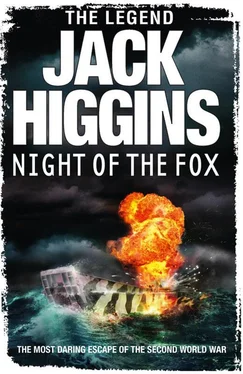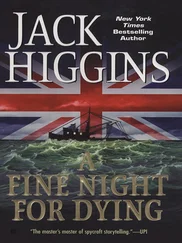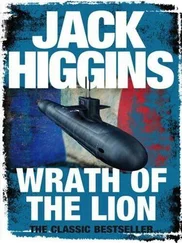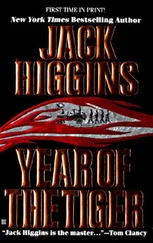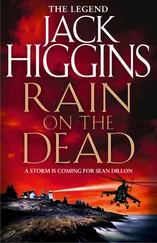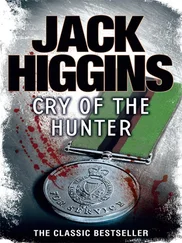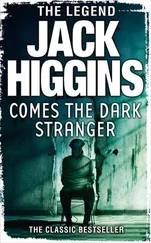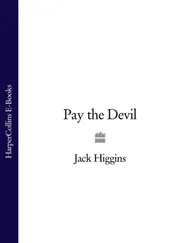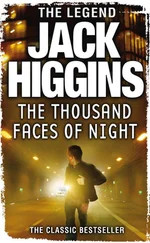‘Nineteen,’ she said. ‘In 1944.’
‘And Martineau?’
‘Look on the piano,’ she said. ‘The end photo in the silver frame.’
I crossed to the piano and picked the photo up and her face jumped out at me, strangely unchanged except in one respect. Her hair was startlingly blond and marcelled – that’s the term I think they used to use. She wore a little black hat and one of those coats from the wartime period with big shoulders and tight at the waist. She also wore silk stockings and high-heeled shoes and clutched a black patent-leather bag.
The man standing next to her was of medium height and wore a leather military trenchcoat over a tweed suit, hands thrust deep into the pockets. His face was shadowed by a dark slouch hat and a cigarette dangled from the corner of his mouth. The eyes were dark, no expression to them at all, and his smile had a kind of ruthless charm. He looked a thoroughly dangerous man.
Sarah Drayton got up and joined me. ‘Not much like the Croxley Professor of Moral Philosophy at Oxford there, is he?’
‘Where was it taken?’ I asked.
‘In Jersey. Not too far from here. May nineteen forty-four. The tenth, I think.’
‘But I’ve been in Jersey long enough to know that it was occupied by the Germans at that time,’ I said.
‘Very much so.’
‘And Martineau was here? With you?’
She crossed to a Georgian desk, opened a drawer and took out a small folder. When she opened it I saw at once that it contained several old photographs. She passed one to me. ‘This one I don’t keep on top of the piano for obvious reasons.’
She was dressed pretty much as she had. been in the other photo and Martineau wore the same leather trenchcoat. The only difference was the SS uniform underneath, the silver death’s-head badge in his cap. ‘Standartenführer Max Vogel,’ she said. ‘Colonel, to you. He looks rather dashing, doesn’t he?’ She smiled as she took it from me. ‘He had a weakness for uniforms, Harry.’
‘Dear God,’ I said. ‘What is all this?’
She didn’t answer, but simply passed me another photo. It was faded slightly, but still perfectly clear. A group of German officers. In front of them stood two men on their own. One was Martineau in the SS uniform, but it was the other who took my breath away. One of the best-known faces of the Second World War. Field Marshal Erwin Rommel. The Desert Fox himself.
I said, ‘Was that taken here too?’
‘Oh yes.’ She put the photos back in the desk and picked up my glass. ‘I think you could do with another drink.’
‘Yes, I believe I could.’
She got me one, handed the glass to me, and we moved to the fire. She took a cigarette from the box. ‘I should stop, I suppose. Too late now. Another bad habit Harry taught me.’
‘Do I get an explanation?’
‘Why not?’ she said, and turned as rain drummed against the French windows. ‘I can’t think of anything better to do on an afternoon like this, can you?’
LONDON
It started, if one can ever be certain where anything starts, with a telephone call received by Brigadier Dougal Munro at his flat in Haston Place, ten minutes’ walk from the London headquarters of SOE in Baker Street. As head of Section D at SOE he had two phones by his bed, one routed straight through to his office. It was this that brought him awake at four o’clock on the morning of April 28, 1944.
He listened, face grave, then swore softly. ‘I’ll be right over. One thing, check if Eisenhower is in town.’
Within five minutes he was letting himself out of the front door, shivering in the damp cold, lighting the first cigarette of the day as he hurried along the deserted street. He was at that time sixty-five, a squat, powerful-looking man with white hair, his round, ugly face set off by steel-rimmed spectacles. He wore an old Burberry raincoat and carried an umbrella.
There was very little of the military in either his bearing or his appearance, which was hardly surprising. His rank of brigadier was simply to give him the necessary authority in certain quarters. Until 1939, Dougal Munro had been an archaeologist by profession. An Egyptologist, to be more precise, and fellow of All Souls at Oxford. For three years now, head of Section D at SOE. What was commonly referred to in the trade as the dirty tricks department.
He turned in at the entrance of Baker Street, nodded to the night guard and went straight upstairs. When he went into his office, Captain Jack Carter, his night duty officer, was seated behind his desk. Carter had a false leg, a legacy of Dunkirk. He reached for his stick and started to get up.
‘No, stay where you are, Jack,’ Munro told him. ‘Is there any tea?’
‘Thermos flask on the map table, sir.’
Munro unscrewed the flask, poured a cup and drank. ‘God, that’s foul, but at least it’s hot. Right, get on with it.’
Carter now got up and limped across. There was a map of the southwest of England on the table, concentrating mainly on Devon, Cornwall and the general area of the English Channel.
‘Exercise Tiger, sir,’ he said. ‘You remember the details?’
‘Simulated landings for Overlord.’
‘That’s right. Here in Lyme Bay in Devon there’s a place called Slapton Sands. It bears enough similarities to the beach we’ve designated Utah in the Normandy landings to make it invaluable for training purposes. Most of the young Americans going in have no combat experience.’
‘I know that, Jack,’ Munro said. ‘Go on.’
‘Last night’s convoy consisted of eight landing craft. Five from Plymouth and three from Brixham. Under naval escort, of course. They were to do a practice beach landing at Slapton.’
There was a pause. Munro said, ‘Tell me the worst.’
‘They were attacked at sea by German E-boats, we think the Fifth and Ninth Schnellboote Flotillas from Cherbourg.’
‘And the damage?’
‘Two landing craft sunk for certain. Others torpedoed and damaged.’
‘And the butcher’s bill?’
‘Difficult to be accurate at the moment. Around two hundred sailors and four hundred and fifty soldiers.’
Munro said. ‘Are you trying to tell me we lost six hundred and fifty American servicemen last night? Six hundred and fifty and we haven’t even started the invasion of Europe?’
‘I’m afraid so.’
Munro walked restlessly across the room and stood at the window. ‘Has Eisenhower been told?’
‘He’s in town, sir, at Hayes Lodge. He wants to see you at breakfast. Eight o’clock.’
‘And he’ll want the facts.’ Munro turned and went to his desk.
‘Were there any Bigots among those officers lost?’
‘Three, sir.’
‘Dear God, I warned them. I warned them about this,’ Munro said. ‘No Bigot to in any way undertake hazardous duty.’
Some months previously it had become regrettably clear that there were serious breaches of security, in some cases by high-ranking American officers, in connection with the projected invasion of Europe. The Bigot procedure had been brought in as an answer to the situation. It was an intelligence classification above Most Secret. Bigots knew what others did not – the details of the Allied invasion of Europe.
‘The three are missing so far,’ Carter said. ‘I’ve got their files.’
He laid them on the desk and Munro examined them quickly. ‘Stupid,’ he said. ‘Unbelievably stupid. Take this man, Colonel Hugh Kelso.’
‘The engineering officer?’ Carter said. ‘He’s already visited two of the Normandy beaches by night, courtesy of Four Commando, to check on the suitability of the terrain for vehicles.’
‘Sword Beach and Utah Beach.’ Munro groaned. ‘For God’s sake, Jack, what if he was picked up by one of those E-boats? He could be in enemy hands right now. And they’ll make him talk if they want to, you know that.’
Читать дальше
